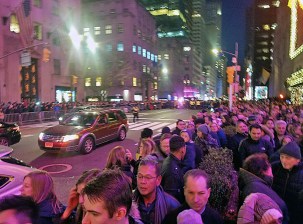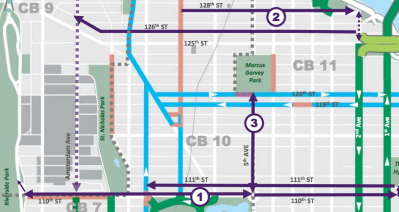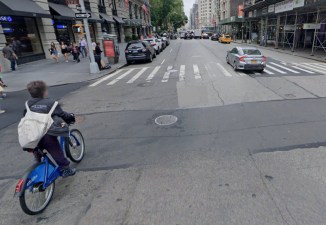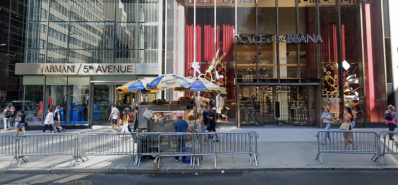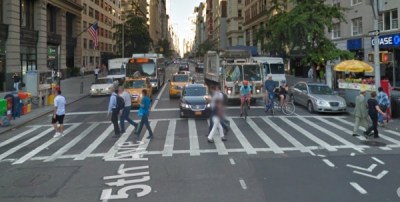Fifth Time’s the Charm? Advocates Wary of City’s Latest Talk of Redesigning the Ritzy Avenue
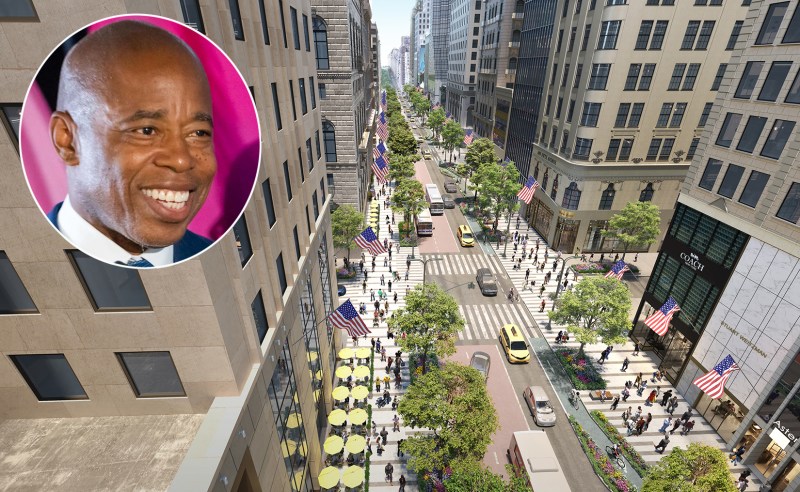

Money talks.
More than two years since the city first proposed a full-fledged redesign of Fifth Avenue that included a car-free busway, Mayor Adams on Sunday announced what he’s calling a “major new visioning process to reimagine” the world-famous Manhattan corridor with improved pedestrian and cycling space, and expanded sidewalks.
But there’s nothing new about it, advocates say. And, it’s only half of what they bargained for.
“I’ll celebrate when we break ground or see changes on the street — for now it just feels like a big nothingburger,” said Samir Lavingia, who is a member of Community Board 5, but spoke to Streetsblog in a personal capacity.
On the last of the three car-free Sundays on Fifth Avenue for the holiday season, Hizzoner announced support for redesigning the grand boulevard between 42nd and 59th streets into a roadway that “will prioritize pedestrians, cyclists, mass transit, and the public realm.”
The Adams administration’s new so-called “visioning process” follows years of failed attempts. Former Mayor Bill de Blasio presented his busway dream, but then watered it down in deference to luxury retailers along the strip. He then punted it to Mayor Adams, who, on Sunday, used some of the same images that were first put forward by the Fifth Avenue Association in 2021 to unveil his version and to announce that the Department of Transportation and the Economic Development Corporation would contract with a yet-to-be-selected design firm in 2023 to come up with a vision and construction plan that won’t be completed for at least two more years.
And as part of the plan, the city will work in “consultation with the community.”

It’s great that the city says they’re finally moving forward with a plan for Fifth Avenue, activists say, but it shouldn’t require even more community engagement after years of only just that — and Manhattan’s Community Board 5 already gave the exact design a thumbs-up.
“It is concerning that it looks so similar to what we’ve been talking about for at least a couple years. I don’t want to see any more delays,” said safe streets activist Barak Friedman, who lives in Midtown.
It’s no secret that the Fifth Avenue Association, along with one of the city’s most prolific and powerful real estate developers, Steven Roth, had been trying to put — and inevitably succeeded in putting — the kibosh on the de Blasio-era project, arguing that it would delay pandemic recovery.
“There’s no urgent need to proceed with these changes at this moment,” Jerome Barth, then-president of the Fifth Avenue Association, said at the time. “This is not the right time. We’re still in the throes of a pandemic. It’s great we want to upgrade bus speeds a little, but maybe this is not the right way to think about the problem.”
Instead, the business-boosting group put forward a long-term vision for the avenue that would turn the current five-lane roadway between the New York Public Library at 42nd Street and Central Park into a tree-lined walkway with an unprotected bike lane, and much wider sidewalks, while retaining Fifth Avenue’s double dedicated bus lanes, but still allowing for a lane for cars.

At the time, the Fifth Avenue Association had lamented that its members didn’t like the look of temporary infrastructure such as bollards or flex-posts and wanted something more permanent and expensive looking to reflect the ritzy corridor where tourists from all over the world drop tens of thousands of dollars at luxury retailers such as Tiffany and Co., Dolce & Gabbana, and Saks Fifth Avenue — which, during the city’s first-ever Fifth Avenue open street on Sundays, was offering customers $2,000 if they spent $10,000. Complimentary hot chocolate for every guest was also offered.
“Foreigners traveling from wealthier cities around the world come, pull up to a store, shop, and those buyers spend $250,000 in a single run,” Fifth Avenue real estate broker Robert Siegel said during a community board meeting in 2021 by way of demanding space for car drivers.
Then, Barth pitched his group’s vision with the caveat that DOT would have to pause its plans to implement more imminent changes to the avenue, and instead work towards the long-term vision.
Community Board 5 was nonetheless on board, according to its resolution from September 2021, so long as the city also moved forward with installing more immediate fixes to the dangerous corridor, like the busway and traffic restrictions between 57th and 42nd streets.
But that never happened, and it’s unclear if it will. The city’s plan now says it will “identify and implement early action improvements” early next year. A spokesperson for the city declined to elaborate on what those would include.
According to advocates, any redesign of Fifth Avenue must include protected bike lanes, expanded pedestrian space, and better bus lanes, and not be any further delayed.
“A redesigned Fifth Avenue is long overdue,” said Anna Melendez, Manhattan Organizer at Transportation Alternatives. “For far too long, Fifth Avenue has prioritized the movement and storage of cars above the needs of pedestrians, bike riders, and bus riders. At minimum, any Fifth Avenue proposal must include protected bike lanes, expanded pedestrian space, and better bus lanes — creating equitable and sustainable transportation options for all who commute and work in Midtown.”
The difference between now and two years ago, according to activist Janet Liff is that the powerful business groups are no longer pushing back.
“They were not happy. That was the missing piece I think before,” said Liff. “The difference now is finally, the Fifth Avenue Association fought it for so long and now they are on board.”
The Fifth Avenue Association declined to comment beyond its statement included in the mayor’s press release, applauding the success of the open street.
“Fifth Avenue has been an economic powerhouse for the city and a leader in retail, tourism, and office space. However, there hasn’t been a public investment in over 100 years. The sidewalks can’t accommodate the crowds, and the streets are overly congested,” said Ed Hogan, the board chair of the Fifth Avenue Association. “Open Streets has shown how improving the pedestrian experience can draw more New Yorkers and tourists to this iconic global corridor.”
